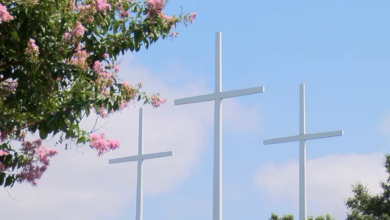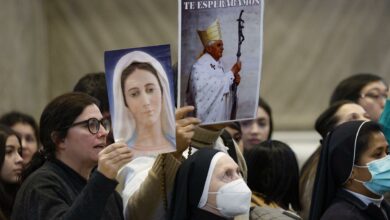A darker Christmas in Damascus amid economic crisis, electricity shortage

By Rania Zanoun
Damascus, Dec 24 (EFE).- The streets of Damascus this year have not lit up with their traditional Christmas lights due to the electricity shortage affecting the Syrian capital amid an economic crisis.
Despite there hasn’t been active conflict in years, this year’s Christmas is marred by economic sanctions imposed against Syria and its president Bashar al-Assad’s regime by the West, affecting the energy supply and import of products such as Christmas decorations and trees.
Syria is a majority Muslim country, but 10% of its population is Christian.
Maida, a Syrian Christian, has returned to Damascus to celebrate Christmas with her family.
“Damascus is dressed in black this year, as if the sadness of the years of war dominated the panorama,” she tells Efe.
But Christmas adornments are not a priority for the local government, which is grappling with a shortage of oil and gas, forcing authorities to ration energy supply over the year.
While traditionally the streets of Damascus are illuminated with Christmas lights all night long, this year the lights will only be turned on for a few hours and only three Christmas trees have been set up throughout the entire city.
The shortage of electricity also affects local families, who must take advantage of the little light they have available for their basic needs.
But not all have lost hope.
In the Bab Sharqi neighborhood, one of the liveliest in the Old City, local venues are trying their best to maintain a Christmas atmosphere despite the difficulties.
“We will do everything possible to celebrate since we love this land and the lover does the impossible for his beloved. This is Damascus,” Tony, owner of a night club in the neighborhood tells Efe.
While Samer, owner of a restaurant in this same neighborhood, laments that the sound of electric generators have replaced the Christmas vibe and that many restaurants have had to give up exterior lights to be able to illuminate the interior of the premises.
Sales have also suffered, as Syrians’ purchasing power has fallen sharply with rising inflation and the plummeting value of the local currency.
“This year there is a standstill in sales. I didn’t even sell a few lights as the prices are high and materials are few,” Bashar, a store merchant, tells Efe.
Not only have imports been affected by the sanctions, but the government has prohibited the purchase of non-essential products to save foreign currency, which is necessary to pay for other goods such as oil and grains.
Safaa, Marwa and Yara own an events company, but this year they lost 70% of their business.
In 2020, a tree and its decorations cost some 50 dollars, while this year it can cost up to 400 dollars, they tell Efe.
The difference in the value of the lira against the dollar makes all products enormously expensive meaning Syrians can afford fewer and fewer luxuries.
Eight out of ten people in Syria live below the poverty line, according to the UN Office for the Coordination of Humanitarian Affairs (OCHA). EFE





